实验2 类和对象_基础编程1
实验2 类和对象_基础编程1
实验任务 1
t.h
#pragma once
#include <string>
// 类T: 声明
class T {
// 对象属性、方法
public:
T(int x = 0, int y = 0); // 普通构造函数
T(const T &t); // 复制构造函数
T(T &&t); // 移动构造函数
~T(); // 析构函数
void adjust(int ratio); // 按系数成倍调整数据
void display() const; // 以(m1, m2)形式显示T类对象信息
private:
int m1, m2;
// 类属性、方法
public:
static int get_cnt(); // 显示当前T类对象总数
public:
static const std::string doc; // 类T的描述信息
static const int max_cnt; // 类T对象上限
private:
static int cnt; // 当前T类对象数目
// 类T友元函数声明
friend void func();
};
// 普通函数声明
void func();
t.cpp
// 类T: 实现
// 普通函数实现
#include "t.h"
#include <iostream>
#include <string>
using std::cout;
using std::endl;
using std::string;
// static成员数据类外初始化
const std::string T::doc{"a simple class sample"};
const int T::max_cnt = 999;
int T::cnt = 0;
// 对象方法
T::T(int x, int y) : m1{x}, m2{y} {
++cnt;
cout << "T constructor called.\n";
}
T::T(const T &t) : m1{t.m1}, m2{t.m2} {
++cnt;
cout << "T copy constructor called.\n";
}
T::T(T &&t) : m1{t.m1}, m2{t.m2} {
++cnt;
cout << "T move constructor called.\n";
}
T::~T() {
--cnt;
cout << "T destructor called.\n";
}
void T::adjust(int ratio) {
m1 *= ratio;
m2 *= ratio;
}
void T::display() const { cout << "(" << m1 << ", " << m2 << ")"; }
// 类方法
int T::get_cnt() { return cnt; }
// 友元
void func() {
T t5(42);
t5.m2 = 2049;
cout << "t5 = ";
t5.display();
cout << endl;
}
task1.cpp
#include "t.h"
#include <iostream>
using std::cout;
using std::endl;
void test();
int main() {
test();
cout << "\nmain: \n";
cout << "T objects'current count: " << T::get_cnt() << endl;
}
void test() {
cout << "test class T: \n";
cout << "T info: " << T::doc << endl;
cout << "T objects'max count: " << T::max_cnt << endl;
cout << "T objects'current count: " << T::get_cnt() << endl << endl;
T t1;
cout << "t1 = ";
t1.display();
cout << endl;
T t2(3, 4);
cout << "t2 = ";
t2.display();
cout << endl;
T t3(t2);
t3.adjust(2);
cout << "t3 = ";
t3.display();
cout << endl;
T t4(std::move(t2));
cout << "t3 = ";
t4.display();
cout << endl;
cout << "T objects'current count: " << T::get_cnt() << endl;
func();
}
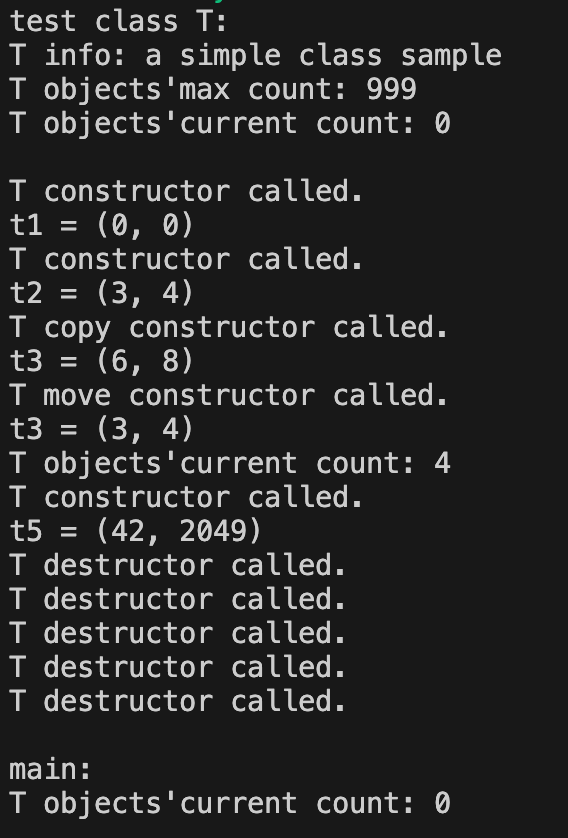
问题1:

错误原因:'func' was not declared in this scope
问题2:
-
普通构造函数
T(int x = 0, int y = 0):- 功能:用于创建 T 类的对象,并初始化对象的属性 m1 和 m2。可以通过参数传递自定义的初始值,若未提供则默认初始化为 0。
- 调用时机:在创建 T 类对象时自动调用,例如
T obj(5, 10);。
-
复制构造函数
T(const T &t):- 功能:用于通过已有的 T 类对象创建新对象,通常用于实现对象的复制。在复制时,会将传入对象 t 的 m1 和 m2 属性复制到新对象中。
- 调用时机:当用一个已有对象初始化另一个对象时自动调用,例如
T obj2(obj);。
-
移动构造函数
T(T &&t):- 功能:用于通过移动语义优化对象的创建,将资源的所有权从一个对象转移到另一个对象。移动构造函数通常会将原对象的属性值“窃取”给新对象,同时将原对象的属性置为无效状态。
- 调用时机:当用一个临时对象初始化另一个对象时自动调用,例如
T obj3(std::move(obj2));。
-
析构函数
~T():- 功能:用于在对象生命周期结束时释放对象占用的资源,例如释放动态分配的内存。
- 调用时机:当对象生命周期结束,或者对象超出作用域时自动调用,例如,当
obj、obj2或obj3的作用域结束时,析构函数会被调用。
问题3:
不能
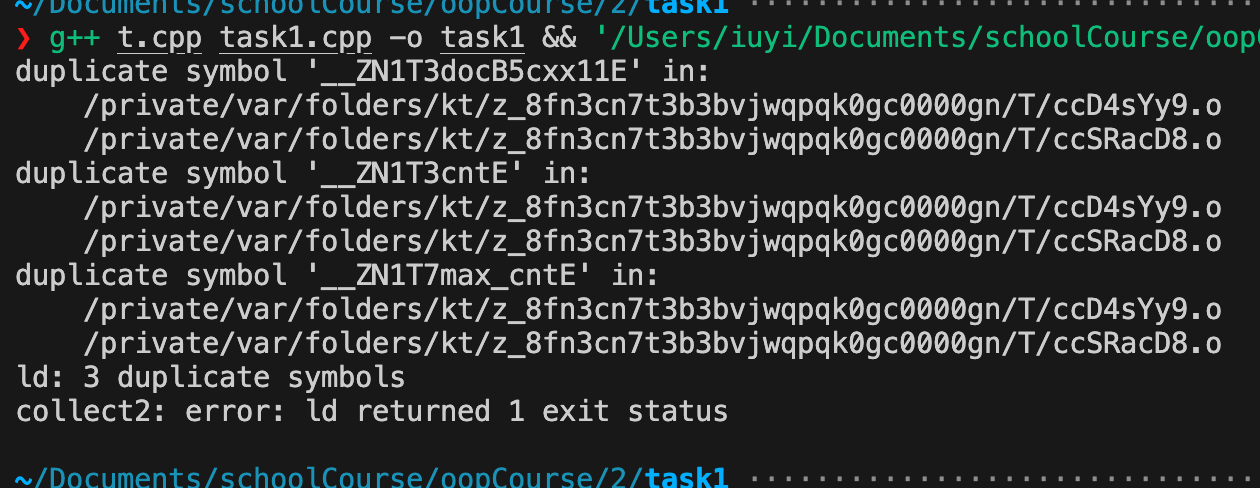
ld: 3 duplicate symbols
实验任务 2
Complex.h
#ifndef COMPLEX_H
#define COMPLEX_H
#include <cmath>
#include <string>
class Complex {
double real;
double imag;
public:
static const std::string doc;
Complex();
Complex(double real);
Complex(double real, double imag);
Complex(const Complex &other);
double get_real() const;
double get_imag() const;
void add(const Complex &other);
friend Complex add(const Complex &c1, const Complex &c2);
friend bool is_equal(const Complex &c1, const Complex &c2);
friend bool is_not_equal(const Complex &c1, const Complex &c2);
friend void output(const Complex &c);
friend double abs(const Complex &c);
};
#endif // COMPLEX_H
Complex.cpp
#include "Complex.h"
#include <iostream>
const std::string Complex::doc = "a simplified complex class";
Complex::Complex() : real(0), imag(0) {}
Complex::Complex(double real) : real(real), imag(0) {}
Complex::Complex(double real, double imag) : real(real), imag(imag) {}
Complex::Complex(const Complex &other) : real(other.real), imag(other.imag) {}
double Complex::get_real() const { return real; }
double Complex::get_imag() const { return imag; }
void Complex::add(const Complex &other) {
real += other.real;
imag += other.imag;
}
Complex add(const Complex &c1, const Complex &c2) {
return Complex(c1.real + c2.real, c1.imag + c2.imag);
}
bool is_equal(const Complex &c1, const Complex &c2) {
return c1.real == c2.real && c1.imag == c2.imag;
}
bool is_not_equal(const Complex &c1, const Complex &c2) {
return c1.real != c2.real || c1.imag != c2.imag;
}
void output(const Complex &c) {
if (c.imag == 0) {
std::cout << c.real;
}
else if (c.imag > 0) {
std::cout << c.real << "+" << c.imag << "i";
}
else {
std::cout << c.real << c.imag << "i";
}
}
double abs(const Complex &c) {
return std::sqrt(c.real * c.real + c.imag * c.imag);
}
test2.cpp
#include "Complex.h"
#include <iostream>
using std::boolalpha;
using std::cout;
using std::endl;
void test() {
cout << "类成员测试: " << endl;
cout << Complex::doc << endl;
cout << endl;
cout << "Complex对象测试: " << endl;
Complex c1;
Complex c2(3, -4);
const Complex c3(3.5);
Complex c4(c3);
cout << "c1 = ";
output(c1);
cout << endl;
cout << "c2 = ";
output(c2);
cout << endl;
cout << "c3 = ";
output(c3);
cout << endl;
cout << "c4 = ";
output(c4);
cout << endl;
cout << "c4.real = " << c4.get_real() << ", c4.imag = " << c4.get_imag()
<< endl;
cout << endl;
cout << "复数运算测试: " << endl;
cout << "abs(c2) = " << abs(c2) << endl;
c1.add(c2);
cout << "c1 += c2, c1 = ";
output(c1);
cout << endl;
cout << boolalpha;
cout << "c1 == c2 : " << is_equal(c1, c2) << endl;
cout << "c1 != c3 : " << is_not_equal(c1, c3) << endl;
c4 = add(c2, c3);
cout << "c4 = c2 + c3, c4 = ";
output(c4);
cout << endl;
}
int main() { test(); }
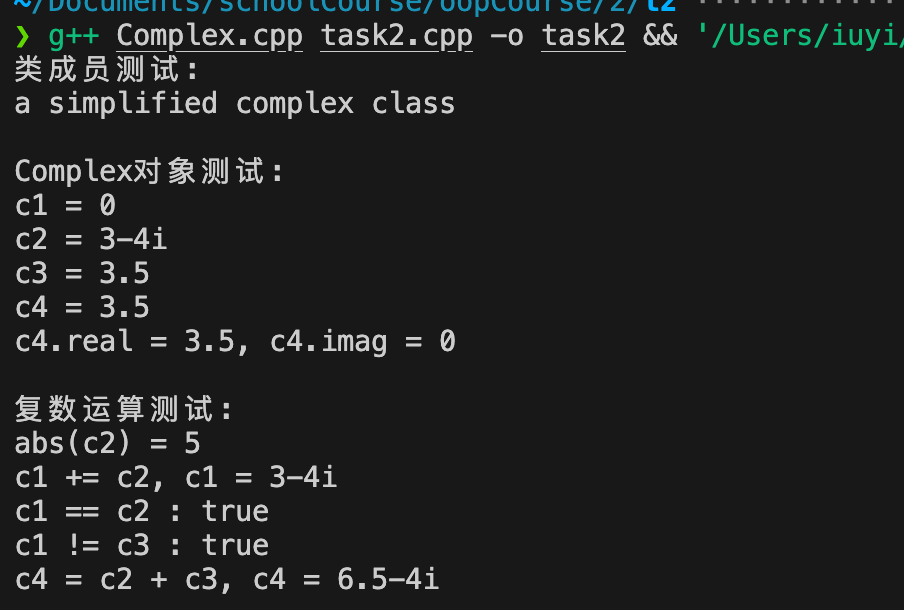
实验任务 3
#include <complex>
#include <iostream>
using std::boolalpha;
using std::complex;
using std::cout;
using std::endl;
void test() {
cout << "标准库模板类complex测试: " << endl;
complex<double> c1;
complex<double> c2(3, -4);
const complex<double> c3(3.5);
complex<double> c4(c3);
cout << "c1 = " << c1 << endl;
cout << "c2 = " << c2 << endl;
cout << "c3 = " << c3 << endl;
cout << "c4 = " << c4 << endl;
cout << "c4.real = " << c4.real() << ", c4.imag = " << c4.imag() << endl;
cout << endl;
cout << "复数运算测试: " << endl;
cout << "abs(c2) = " << abs(c2) << endl;
c1 += c2;
cout << "c1 += c2, c1 = " << c1 << endl;
cout << boolalpha;
cout << "c1 == c2 : " << (c1 == c2) << endl;
cout << "c1 != c3 : " << (c1 != c3) << endl;
c4 = c2 + c3;
cout << "c4 = c2 + c3, c4 = " << c4 << endl;
}
int main() { test(); }
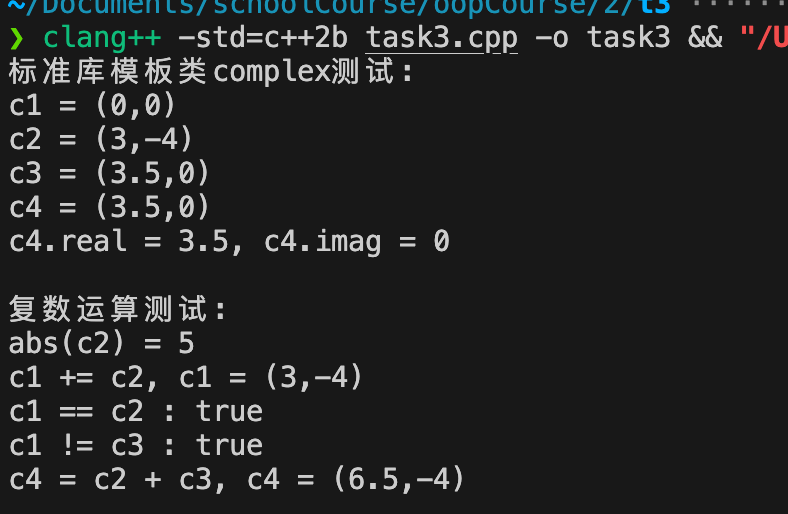
观察:c++stl 实现了 complex<T> operator "" i(T)
实验任务 4
Fraction.h
// Fraction.h
#ifndef FRACTION_H
#define FRACTION_H
#include <iostream>
#include <string>
class Fraction {
public:
static const std::string doc;
Fraction(int up = 0, int down = 1); // 构造函数
Fraction(const Fraction &other); // 拷贝构造函数
~Fraction() {}; // 析构函数
int get_up() const;
int get_down() const;
Fraction negative() const;
friend Fraction add(const Fraction &f1, const Fraction &f2);
friend Fraction sub(const Fraction &f1, const Fraction &f2);
friend Fraction mul(const Fraction &f1, const Fraction &f2);
friend Fraction div(const Fraction &f1, const Fraction &f2);
friend void output(const Fraction &f);
private:
int up; // 分子
int down; // 分母
void simplify(); // 化简分数
};
#endif
Fraction.cpp
// Fraction.cpp
#include "Fraction.h"
#include <numeric>
const std::string Fraction::doc =
"Fraction类 v 0.01版.\n"
"目前仅支持分数对象的构造、输出、加/减/乘/除运算.";
// 构造函数
Fraction::Fraction(int up, int down) : up(up), down(down) {
if (down == 0) {
throw std::invalid_argument("Denominator cannot be zero.");
}
simplify();
}
// 拷贝构造函数
Fraction::Fraction(const Fraction &other) : up(other.up), down(other.down) {}
// 获取分子
int Fraction::get_up() const { return up; }
// 获取分母
int Fraction::get_down() const { return down; }
// 求负
Fraction Fraction::negative() const { return Fraction(-up, down); }
// 分数加法
Fraction add(const Fraction &f1, const Fraction &f2) {
int up = f1.up * f2.down + f2.up * f1.down;
int down = f1.down * f2.down;
return Fraction(up, down);
}
// 分数减法
Fraction sub(const Fraction &f1, const Fraction &f2) {
int up = f1.up * f2.down - f2.up * f1.down;
int down = f1.down * f2.down;
return Fraction(up, down);
}
// 分数乘法
Fraction mul(const Fraction &f1, const Fraction &f2) {
int up = f1.up * f2.up;
int down = f1.down * f2.down;
return Fraction(up, down);
}
// 分数除法
Fraction div(const Fraction &f1, const Fraction &f2) {
if (f2.up == 0) {
throw std::invalid_argument("Denominator cannot be zero.");
}
int up = f1.up * f2.down;
int down = f1.down * f2.up;
return Fraction(up, down);
}
// 输出分数
void output(const Fraction &f) {
if (f.down == 1) {
std::cout << f.up;
return;
}
std::cout << f.up << "/" << f.down;
}
// 化简分数
void Fraction::simplify() {
int gcd = std::gcd(abs(up), abs(down));
up /= gcd;
down /= gcd;
if (down < 0) {
up = -up;
down = -down;
}
}
test4.cpp
#include "Fraction.h"
#include <iostream>
using std::cout;
using std::endl;
void test1() {
cout << "Fraction类测试: " << endl;
cout << Fraction::doc << endl << endl;
Fraction f1(5);
Fraction f2(3, -4), f3(-18, 12);
Fraction f4(f3);
cout << "f1 = ";
output(f1);
cout << endl;
cout << "f2 = ";
output(f2);
cout << endl;
cout << "f3 = ";
output(f3);
cout << endl;
cout << "f4 = ";
output(f4);
cout << endl;
Fraction f5(f4.negative());
cout << "f5 = ";
output(f5);
cout << endl;
cout << "f5.get_up() = " << f5.get_up()
<< ", f5.get_down() = " << f5.get_down() << endl;
cout << "f1 + f2 = ";
output(add(f1, f2));
cout << endl;
cout << "f1 - f2 = ";
output(sub(f1, f2));
cout << endl;
cout << "f1 * f2 = ";
output(mul(f1, f2));
cout << endl;
cout << "f1 / f2 = ";
output(div(f1, f2));
cout << endl;
cout << "f4 + f5 = ";
output(add(f4, f5));
cout << endl;
}
void test2() {
Fraction f6(42, 55), f7(0, 3);
cout << "f6 = ";
output(f6);
cout << endl;
cout << "f7 = ";
output(f7);
cout << endl;
cout << "f6 / f7 = ";
output(div(f6, f7));
cout << endl;
}
int main() {
cout << "测试1: Fraction类基础功能测试\n";
test1();
cout << "\n测试2: 分母为0测试: \n";
test2();
}
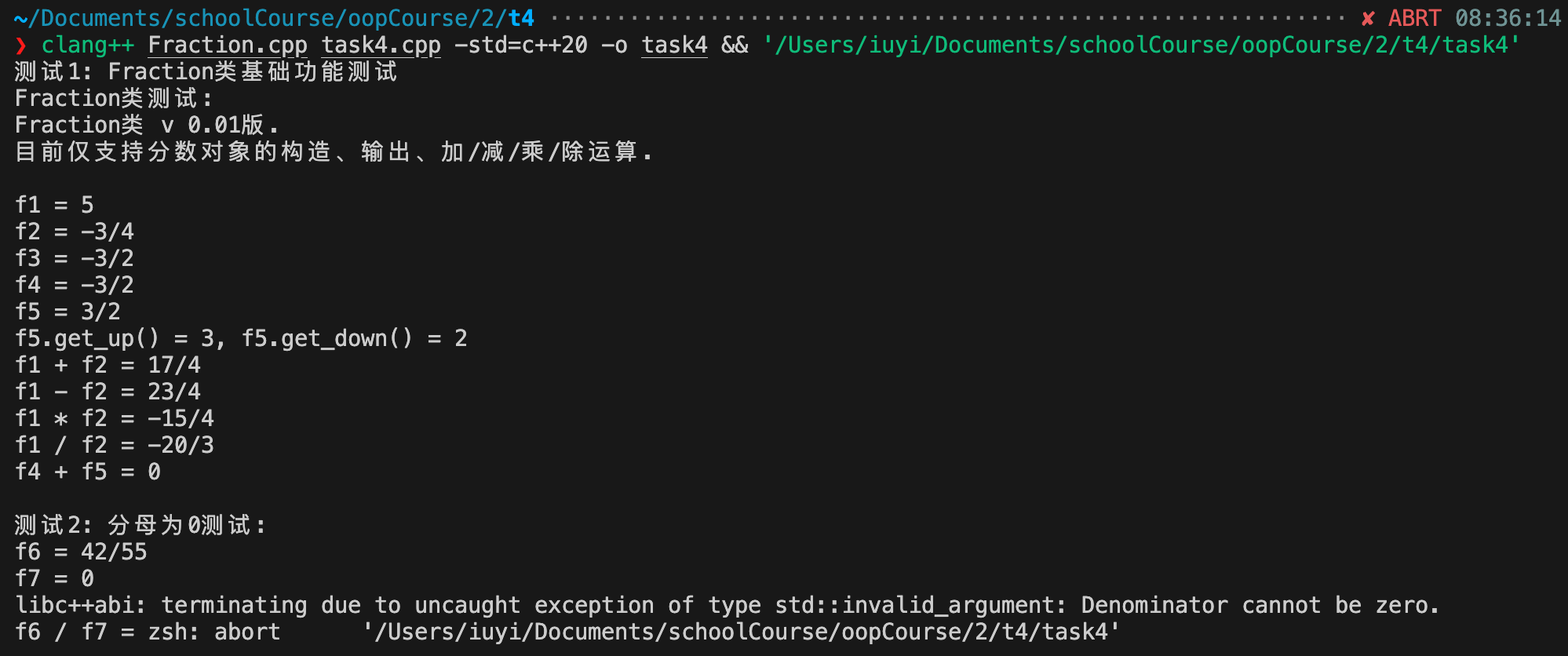
实验任务 5
(没教材)
...


